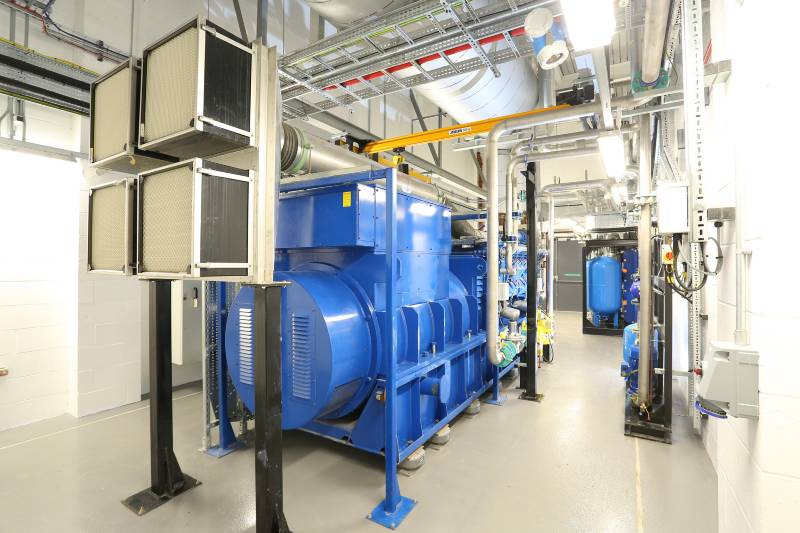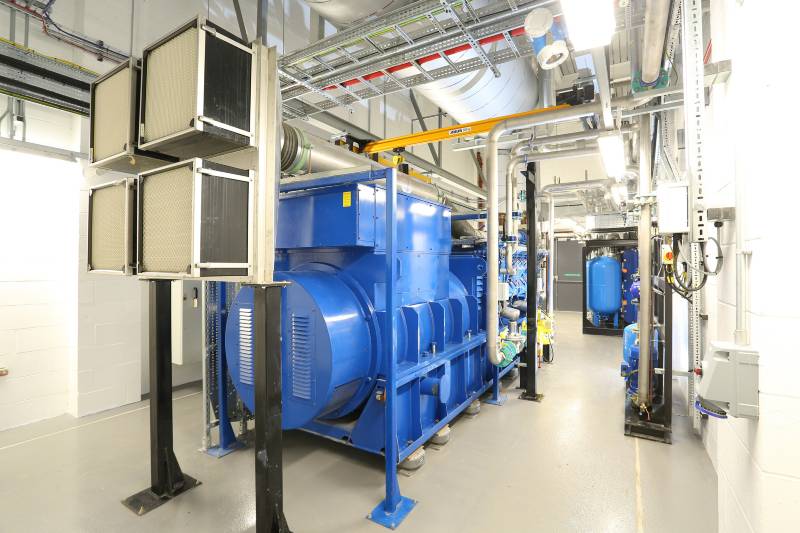Search

In an article written for Heating and Ventilating Review, Edina CEO Hugh Richmond explains how Combined Heat and Power (CHP) generation can help businesses reduce costs and energy consumption in a challenging post-pandemic environment.
The coronavirus outbreak has proved a sharp shock for UK businesses, many of which have seen revenues stagnate. Energy is a major overhead for most businesses, so focusing on proven cost reduction measures such as onsite CHP/cogeneration can deliver excellent savings.
CHP is often the most effective energy cost reduction technology, particularly for sites with a high heating or cooling demand. Cogeneration can provide savings of up to 40% and a payback on investment of 2-3 years. Considering that CHP plants have a lifespan of 10-15 years, this is outstanding.

1. High efficiency
Good quality CHP plays a crucial role in driving primary energy efficiency and is almost twice as efficient as using separate grid power and individual boilers. Correctly sized cogeneration systems can achieve exceptionally high efficiencies of up to 90%.
Traditional power stations generate a significant amount of waste heat. The key advantage of CHP systems is that they recover much of the heat 'lost' during cogeneration and use it to heat spaces, water, or in process heating.
Alternatively, a CHP installation can be configured for combined cooling, heat and power (CCHP)/trigeneration application by adding an absorption chiller. Here, the waste heat creates chilled water for use in energy-intensive processes like refrigeration and process cooling, or for air conditioning.
CHP also achieves power efficiencies because there are no transmission losses (of around 7-8%) experienced when transporting electricity to customers from remote power stations.
Read: How Gateshead Council is reducing costs and carbon emissions by using cogeneration technology.
2. Low fuel costs
An on-site CHP installation will typically generate electricity from natural gas at a cheaper rate than you can procure it from the grid because wholesale gas prices tend to be lower than power prices.
This is due to the 'spark spread' advantage, which is the differential between the price of energy and the cost of fuel used to generate that energy. The price of gas has been consistently cheaper than electricity over the past decade, which shows signs of continuing. For example, in May 2020, month-ahead wholesale gas prices fell to just 9.25 pence per therm in the UK - the lowest level in 21 years.
3. Avoiding premium power pricing
To maximise the overall efficiency of CHP systems and ensure availability of power at all times, businesses use both self-generated and grid electricity supplies. This gives businesses the flexibility to draw on grid power when it is cheapest and to use their self-generated power at peak times. This means that they can avoid purchasing network power during the most expensive hours, such as Triad periods, when prices are vastly inflated.
4. Tax advantages and financial incentives
Additional financial incentives further cement the economic case for CHP. One of the most important is an exemption from the Climate Change Levy (CCL), which makes up approximately 5% of total charges on a typical business energy bill and is one of the largest environmental taxes.
CCL rates increased significantly in 2019 to replace government income lost from the abolished Carbon Reduction Commitment (CRC) Energy Efficiency Scheme. The levy on natural gas increased by a further 19.7% on 1 April 2020 and will continue to increase through to 2023, making the CHP exemption even more important.
In order to benefit from this exemption, businesses must prove that their schemes meet requirements for ‘good quality’ CHP under the Combined Heat and Power Quality Assurance (CHPQA) scheme. These sites will be eligible for CCL exemption on the gas input fuel and the self-generated electricity used on site, as well as other financial incentives. These include preferential business rates and taxation benefits under the Annual Investment Allowance.
In the current difficult economic climate, many businesses are reluctant to use their capital. This is no barrier to adopting CHP as flexible finance options are widely available. There are various options, including low cost power purchase contracts and energy service agreements.
Finance can be tailored to meet specific project requirements and business objectives both short-term and long-term. This could mean zero capital investment with instantaneous energy savings, thus freeing up capital for alternative strategic investments.
As well as generating costs savings, CHP can also reduce carbon emissions due to its high efficiency, particularly in recycling and reusing the heat that is wasted in conventional generation. Of course, when renewable fuels, such as biogas, are used for cogeneration, the carbon savings are all the greater.
Due to its exceptional efficiency a natural gas CHP system can complement other low and zero carbon measures to help organisations work towards their net-zero ambitions. Some companies re-invest the cash savings from CHP into new renewable technologies that may have a longer payback time.
Read: How Arla Foods is using CHP to reduce carbon emissions.
Talk to our expert team to discuss how CHP could reduce your energy costs and carbon emissions. Contact us at www.edina.eu/contact-us/.
These Stories on Combined Heat and Power



Copyright © Edina. All Rights Reserved.